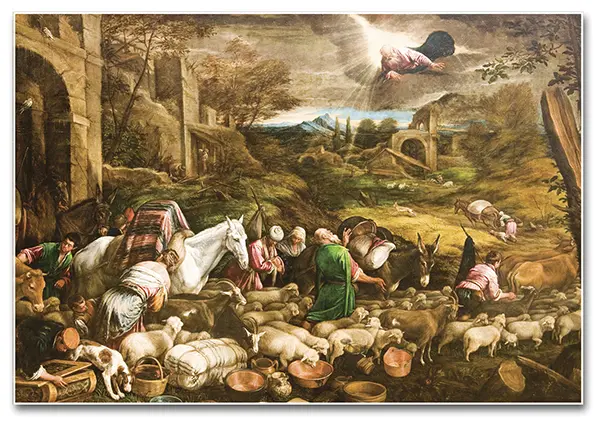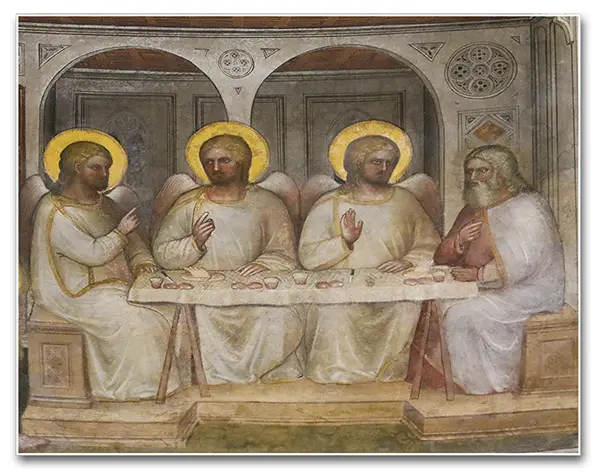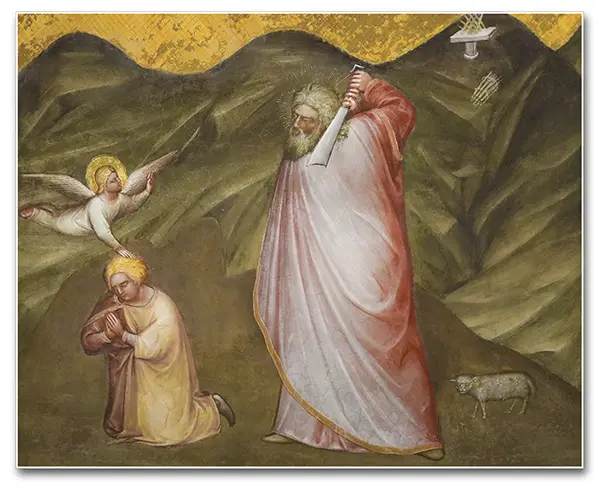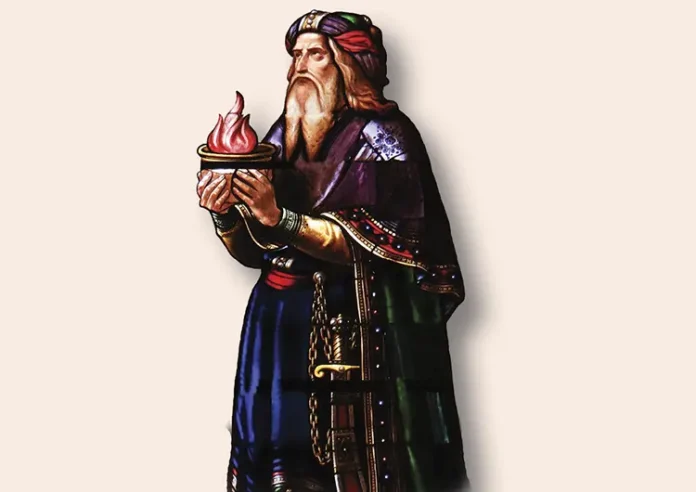“Go from your country and your kindred and your father’s house to the land that I will show you. And I will make of you a great nation” (Gn 12:1-2).
Over the millennia, Abraham’s descendants have repeated this passage countless times, marking the beginning of the great patriarch’s vocation. The Church also exalts him as the one to whom God entrusted the first fruits of his “holy nation” (1 Pt 2:9), the portion chosen “out of all the peoples that are on the face of the earth” (Dt 14:2), from which the Saviour promised to Adam before he was expelled from Paradise would be born (cf. Gn 3:15).
He was eminently a man of faith because, in addition to the straight path of promise and blessing, his life was marked by the capricious zigzag of delays, setbacks and apparent contradictions.1
Glimpses of a robust faith
Using the narratives of the Holy Scriptures and information from Universal History, it can be calculated that God called Abraham between approximately 2000 BC and 1850 BC.
Originally named Abram;2 he was the son of Terah, from the tenth generation after Noah, in the lineage of Shem. A native of Ur of the Chaldeans, he moved with his father and some relatives to Haran, where he first heard the voice of God, commanding him to leave his family and his father’s house.
He promptly left with his wife, Sarah, and his nephew Lot, from Haran to Canaan, taking with him his possessions and slaves. Upon arriving there, the Lord promised him that he would give that land to his descendants. Abraham, however, went from camp to camp until he reached the Negeb, always considering himself a foreigner in the land.
This passage shows the first glimpses of the patriarch’s strong faith: he leaves the comforts of his father’s home and heads for an unknown land, which God had promised only to show him, to give it not to him, but to his descendants. They did not yet exist, however, and Abraham was already seventy-five years old.
Father of a great nation
Abraham, whom we are led to imagine as a robust old man with a calm temperament and strong character, must have meditated deeply on God’s words. Among the promises God had made to him, He had said, “I will make of you a great nation.”
What did it mean, in those times, to be the father of a great nation? One might mistakenly think that in that distant age there were only nomads, such as Abraham and his family, and that humanity lived only in tents… Nothing could be further from the truth.
As chapter 10 of Genesis recounts regarding the posterity of Noah, in the third generation of Ham’s lineage, Nimrod, the “first on earth to be a mighty man” (Gn 10:8), was born. According to commentators and historians, he was the initiator of orderly political life and the autocratically organized State.3
In fact, long before the time of Abraham, large city-states already existed throughout Mesopotamia. The prosperity of agriculture, thanks in great part to the Sumerians’ inventions for soil irrigation, fostered constant trade among them, and as a consequence, small villages were eventually transformed into urban centres in constant development in terms of architecture, literature and economy.
Lagash, Susa, Kish, Assur, Nineveh, Mari, and Babylon were large, powerful, and wealthy cities, and Ur itself had already shown a remarkable degree of civilization.4 No less important was Egypt, at that time ruled by its twelfth dynasty.5
Now, when Abraham received the promise that peoples and kings would be born of him, God asked him to believe that the powerful nations of the earth would be nothing compared to the lineage that would be his descendants. And by faith he glimpsed the deeper meaning of the divine plan.
One certainty: God’s plans will come to pass
About ten years had passed, and Abraham continued to confide; however, like any human being, as he meditated on the promises he had received, acute perplexities certainly came to his mind: “Have I been mistaken? It all seemed so real… Perhaps I have not been faithful, and God has decided to abandon me.” The weight of the years increased, and the possibility of having a son became increasingly unlikely.

“Abraham goes to Canaan”, by Jacopo and Francesco da Ponte – National Gallery of Canada, Ottawa
On a certain starry night, perhaps while recalling the promises amid the pain of uncertainty about his own faithfulness, he heard again the grave and serene voice of God: “Fear not, Abram, I am your shield; your reward shall be very great” (Gn 15:1).
Full of confidence, the patriarch expressed his perplexity, and the Lord, “brought him outside and said, ‘Look toward heaven, and number the stars, if you are able… […] So shall your descendants be’” (Gn 15:5).
These words resonated deep within his soul, making him desire and even glimpse – not through the light of reason, but in a supernatural way – the fulfilment of the divine plans in which he had undeservedly been included. The certainty that the promises would be fulfilled began to shine like the sun within him, and this confidence was based solely on faith in God, for being who He is, and deserving of all love.
Hence St. Paul repeats in his Epistle to the Romans (4:3) and to the Galatians (3:6), as does St. James (2:23): “And he [Abraham] believed the Lord; and He reckoned it to him as righteousness” (Gn 15:6).
This episode reveals something unknown – or forgotten, due to the infidelity of idolatry – to ancient peoples: the Creator’s desire to communicate with men, granting them graces and enflaming souls that do not oppose His action with ardent charity. The wild imagination of the children of Adam, on the contrary, has always produced tyrannical gods, whose cruelty and brutality is confirmed by archaeological discoveries.
Prediction of great suffering
Following this event, the Holy Scriptures recount that the patriarch asked the Lord how he could know if he were to possess that land, to which the Lord replied by ordering him to make an offering. Abraham prepared the animals according to the customs of the time and was then overcome by a deep sleep, accompanied by a “dread” (Gn 15:12). At the same time, a thick darkness covered the place, for it was already evening.
At that moment, God revealed to him that only the fourth generation of his descendants would inherit that land, but not before suffering slavery and oppression for four hundred years in a place where they would be considered to be pilgrims.
To seal the covenant, “a smoking fire pot and a flaming torch passed between these pieces” (Gn 15:17), symbolizing the firmness of that divine oath.
Ishmael, the son of the slave woman
Undoubtedly Abraham shared the graces he received with his wife, for she was co-heir to the promise. But perhaps he did not tell her about the trials his descendants would undergo, because God can only reveal them fully to souls with a special calling, and robust faith.
Perhaps feeling guilty that the couple had no children, Sarah gave her slave Hagar to her husband so that he could have a child with her. In the region where they lived, as in the entire ancient world, masters had complete dominion over their slaves and could dispose of them as they saw fit. Sarah acted according to this concept, aware that if Hagar bore a child, it would not belong to the slave, but to her mistress.
Hagar did indeed conceive and therefore began to show contempt for her mistress… As a result of this rebellious and egalitarian attitude, her son was rejected by Sarah even before he was born, and the Lord participated in this rejection, despite Abraham’s plea for the boy: “‘O that Ishmael might live in Thy sight!’ God said, ‘No, but Sarah your wife shall bear you a son, and you shall call his name Isaac. I will establish my covenant with him as an everlasting covenant for his descendants after him’” (Gn 17:18-19). In this way, God showed clearly that the son of the promise would be born directly from his legitimate wife.
Ishmael received another blessing from the Lord, but he would not be the heir to the promise. As St. Paul refers in his Epistle to the Galatians, alluding to the importance of faith: all who believe in Jesus Christ are free and children of the promise; on the contrary, those who cling to the obsolete customs of the old covenant become like the children of the slave Hagar (cf. Gal 4:21-31).
The son of the promise is born

“Abraham serves the three Angels”, by Giusto de Menabuoi – Baptistery of St. John the Baptist, Padua (Italy)
Abraham was already ninety-nine years old, and Sarah had not yet given him a son. One hot afternoon, as he sat at the door of his tent, he saw three men before him, who were in reality three Angels. With great zeal and hospitality, the patriarch set about serving them, and they predicted that they would return within a year and that, by that time, a son would have been born to him. And so it came to pass.
One can imagine the joy of the couple, who trusted in the Lord despite delay of almost a century without desisting along the way. What affection and caresses the boy must have received from both of them!
The years would pass, and in the midst of that immense joy that still lingered another trial would be introduced, perhaps the cruellest of all…
Abraham’s great trial
God said, “Take your son, your only son Isaac, whom you love, and go to the land of Moriah, and offer him there as a burnt offering upon one of the mountains of which I shall tell you. So Abraham rose early in the morning, saddled his ass, and took two of his young men with him, and his son Isaac; and he cut the wood for the burnt offering, and arose and went to the place of which God had told him” (Gn 22:2-3).
Abraham had many reasons to consider God’s request incoherent: it was a human sacrifice, contrary to natural law; he was to sacrifice the son to whom God had linked the promise of populating the earth; after which Sarah would have every reason to consider him a man who had gone mad or a homicidal father…
Against all hope (cf. Rom 4:18), Abraham confided, without showing any inconformity. His lips did not utter a single word to argue with the Lord, as he had once done for the sake of his nephew Lot. At that crucial moment, when life presented him with the worst possible turn of events and the future of all of humanity depended on his decision, he proved himself to be a man of faith.
“Great indeed was the faith of Abraham. […] in this case it was necessary not only to go beyond human reasonings, but to manifest also something more. For what was of God seemed to be opposed to what was of God; and faith opposed faith, and command promise. […] He [God] enjoined things that were in contradiction to the promises, and yet not even so did the righteous man stagger, nor say he had been deceived. […] By the same faith by which he believed that God gave what was not, and raised up the dead, by the same was he persuaded that He would also raise him up after he had been slain in sacrifice,”6 comments St. John Chrysostom.
On the third day of their journey, Abraham saw the place designated for the sacrifice in the distance. Leaving his servants at the foot of the mountain, he placed the wood on his son’s shoulders and continued on alone with him.
“Isaac said to his father Abraham, ‘My father!’ And he said, ‘Here am I, my son.’ He said, ‘Behold, the fire and the wood; but where is the lamb for a burnt offering?’ Abraham said, ‘God will provide Himself the lamb for a burnt offering, my son.’ So they went both of them together” (Gn 22:7-8).
Despite his faith, it is impossible that deep in his heart Abraham did not suffer at the prospect of becoming the executioner of his own son. And the boy, walking beside his father, was undoubtedly also touched by a grace to understand something of what was happening and to accept being offered in sacrifice. God, who always manifested Himself to the patriarch as Father and Friend, at that moment seemed to hide Himself …
Abraham continues on. It is only when he has bound his son and raises his dagger to sacrifice him that his faith is finally rewarded: “But the Angel of the Lord called to him from Heaven, and said, ‘Abraham, Abraham!’ And he said, ‘Here am I.’ He said, ‘Do not lay your hand on the lad or do anything to him; for now I know that you fear God, seeing you have not withheld your son, your only son, from me’” (Gn 22:11-12). Looking up, he sees a lamb caught by its horns in a bush and offers it in place of Isaac.

“The Sacrifice of Isaac”, by Giusto de Menabuoi – Baptistery of St. John the Baptist, Padua (Italy)
Rewarding his faith, God’s promise becomes an everlasting covenant through an oath: “And the Angel of the Lord called to Abraham a second time from Heaven, and said, ‘By myself I have sworn, says the Lord, because you have done this, and have not withheld your son, your only son, I will indeed bless you, and I will multiply your descendants as the stars of heaven and as the sand which is on the seashore. And your descendants shall possess the gate of their enemies, and by your descendants shall all the nations of the earth bless themselves, because you have obeyed my voice’” (Gn 22:15-18).
This may be considered the event alluded to by Our Lord Jesus Christ in His invective against the Pharisees: “Your father Abraham rejoiced that he was to see my day; he saw it and was glad” (Jn 8:56). What an immense grace that was, to envisage God made Man dwelling on earth, to foresee His Passion, Death and Resurrection, to recognize in his own son, Isaac, one of His prefigures!
Firm in the same faith
Deeply rich in meaning, the various episodes in Abraham’s story are admirable examples for us. Since it is not possible to encompass the greatness of his figure in a limited number of lines, may they serve as an invitation to meditate on the references to him in Sacred Scripture, as well as an appeal to cultivate the same confidence.
Indeed, Abraham lived in a pagan world that denied the existence of God in everything, just as the world of today. However, the Lord saw fit to make the coming of Our Lord Jesus Christ into the world depend on Abraham’s faith, and he was true to the divine desires. For our part, we have also received a promise from Heaven, uttered by the lips of the Blessed Virgin: “In the end, my Immaculate Heart will triumph!”
After contemplating the story of this great patriarch, can we still doubt the fulfilment of these words and, consequently, the victory of Jesus through Mary?
The facts considered here clearly demonstrate that the practice of faith, a supernatural virtue infused at Baptism, is a free and a meritorious act. It is up to our will to cooperate with or to resist the invitations of grace. ◊
Notes
1 The biographical information contained in these lines were taken from chapters 15 to 22 of the Book of Genesis.
2 For clarity, in this article we will always refer to him only as Abraham. God changed his name only after the covenant narrated in chapter 17 of Genesis.
3 Cf. WEISS, Juan-Baptista. Historia Universal. Barcelona: La Educación, 1927, v.I, p.90; CHARBEL, Antônio; LAURINI, Heládio Correia. Comentários ao Livro do Gênesis. In: A Bíblia. São Paulo: April, 1965, p.26, nota 5.
4 Cf. KELLER, Werner. E a Bíblia tinha razão… 5.ed. São Paulo: Melhoramentos, 1960, p.36-37.
5 Cf. WEISS, op. cit., p.525.
6 ST. JOHN CHRYSOSTOM. Homilías sobre la Carta a los Hebreos. Homily XXV, c.1, n.1-4. Madrid: Ciudad Nueva, 2008, p.416-418.


